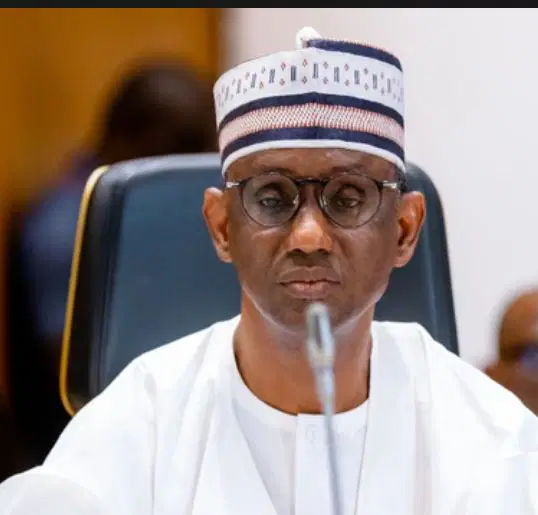
ABUJA — The National Security Adviser, Mallam Nuhu Ribadu, and Chief of Defence Staff, CDS, said yesterday that hunger and poverty are the catalysts fueling insecurity, violence and social disintegration in the country.
This came on a day President Bola Tinubu in Abuja, declared that Nigeria’s agricultural renaissance had begun as he commissioned 2,000 tractors for nationwide deployment, under the Renewed Hope Agricultural Mechanisation Programme, to boost food production in the country.
According to the duo, the two challenges now constitute security threats to the country.
On his part, the NSA, however, said the government of President Bola Tinubu is tackling the challenge through prioritisation of agricultural reforms, social investment programmes, and security sector interventions to break the cycle.
Speaking at the 14th National Security Seminar organised by the Alumni Association of National Defence College in Abuja, Ribadu, who was represented by Major General PP Mala, Director, Defence Affairs, said: “This year’s theme, “Combating Hunger and Poverty for Sustainable Peace and Development in Nigeria,” touched at the very heart of our national challenges
“Hunger and poverty are not merely social concerns; they are catalysts for insecurity, crime, violence, and social disintegration. These issues form a vicious cycle. Poverty leads to insecurity and insecurity, in turn, deepens poverty.
“Under the leadership of President Bola Ahmed Tinubu, the Federal Government has prioritised agricultural reforms, social investment programmes, and security sector interventions aimed at breaking this cycle.
“These efforts are visible through increased support for food security initiatives, enhanced law enforcement capacity, and infrastructure to support agricultural production and distribution.
“At the Office of the National Security Adviser, ONSA, we continue to coordinate both kinetic and non-kinetic efforts across the armed forces, intelligence services, security agencies, and relevant government and non-governmental actors.
“Despite the progress made, issues like unemployment, hunger, and youth disenfranchisement remain persistent and require deeper, long-term solutions. This forum, therefore, presents an excellent platform for collective introspection and sharing of ideas. The challenges we face today are dynamic and multi-faceted. As such, our responses must be coordinated, inclusive, innovative, and forward-thinking.”
The Chief of Defence Staff, CDS, Gen. Christopher Musa, on his part, declared that hunger and poverty are no longer mere social challenges but had become national security threats.
Represented at the seminar by the Chief of Defence Training, Rear Admiral Ibrahim Shetimma, the CDS called for a unified national approach to combating hunger and poverty, stressing their growing impact on Nigeria’s internal security.
He said: “Insecurity today is not only defined by weapons but also by economic deprivation, food insecurity, and social dislocation. Hunger and poverty are no longer mere social challenges, they have become national security threats.
“The North-Central region, particularly Benue State, once considered Nigeria’s food basket, is a clear example of how banditry, displacement and farmer-herder conflicts have devastated agricultural productivity.’’
Musa noted that the disruption of farming communities and illegal occupation of farmlands contributed to food inflation, displacement and mass migration, thereby destabilising both the economy and national cohesion.
He called on communities to deny criminals and terrorists sanctuary by supporting intelligence gathering, timely reporting and community vigilance.
The CDS called for urgent investment in grassroots agricultural development, and urged government and stakeholders to reposition farming as a noble and rewarding profession by enhancing access to credit, infrastructure and market linkages.
“With the migration of rural youth to urban centres, agricultural productivity is declining. We must make farming attractive again — not as a last resort, but as a national duty and a prestigious calling,” he added.
Praising President Tinubu’s Renewed Hope Agenda, particularly its emphasis on financial autonomy for local governments, which he described as vital for responsive and community-driven development, Musa said: “I assure you, the Armed Forces of Nigeria, in synergy with other security agencies and with the support of the people, remain resolute in overcoming all security threats.
“We must build a Nigeria where every citizen can live in peace, engage in productive livelihood and enjoy the dividends of democracy.’’
Human-centred security approaches — Defence
In his remarks, the Defence Minister, Alhaji Mohammad Abubakar, called for human-centred security approaches to solving the challenges by addressing the root causes of insecurity, including unemployment, poverty and social exclusion.
Badaru said: “This seminar underscores the undeniable truth that lasting peace is impossible without addressing the socio-economic vulnerabilities that fuel discontent, radicalisation and crime.
“This year’s seminar, with its emphasis on critical human security concerns, particularly hunger, poverty, and violence, aligns closely with the President’s unwavering commitment to improving the quality of life for all Nigerians.
“This administration’s strategic interventions in agriculture, vocational training, and the provision of essential social services are already impacting countless lives and shaping a future defined by peace and human dignity.
“As we all know, the concept of national security has evolved significantly since the end of the Cold War. Today’s national and global realities demand a broader, human-centred security paradigm.
“It is increasingly evident that military solutions alone cannot fully address the complexities of today’s security challenges. We must confront the root causes — unemployment, poverty, hunger and social exclusion — through a coordinated, multi-sectoral and sustained approach.
“As clearly outlined in Chapter 2 of the National Defence Policy, the focus must now include economic, political, environmental, social and psychological well-being as central to our national security considerations.
The minister pointed out that in a world where security challenges knew no borders, there is need for collective action in addressing the nation’s security concerns.
While calling for a “whole-of-society” approach to tackle pressing issues such as hunger, poverty, and violence, he said: ‘’May our collective efforts continue to strengthen our path towards unity, resilience and sustainable national security.’’
Also speaking at the event, the President of AANDEC, Air Commodore Darlington Abdullahi, retd, underscored the need for sustained investment in education, economic empowerment and social inclusion as critical non-kinetic responses to Nigeria’s deepening food insecurity.
Abdullahi said hunger and poverty are not just humanitarian crises but also strategic threats to national stability, quoting the timeless wisdom that says “the children of the poor you fail to train will never let your children have peace.”
He stressed that neglecting the socio-economic well being of the population creates fertile ground for instability and extremism.
“When millions suffer from hunger and poverty, they become vulnerable to exploitation by those with ill-intentions. We must, therefore, invest in our people, especially in education, livelihoods and skills development.
“Economic initiatives that foster inclusion and bring communities together can be effective tools for peace-building, They create an atmosphere of stability and discourage violence,” he said.
The AANDEC president praised members of the association, comprising retired military officers and senior public servants, as patriots committed to safeguarding Nigeria’s peace and unity beyond the battlefield.
He advocated the creation of a dedicated vocational and leadership development centre for widows and children of fallen heroes, describing it as a necessary step in empowering vulnerable populations and promoting national healing.
Tinubu distributes 2,000 tractors to states to boost agriculture
Meanwhile, President Bola Tinubu has declared that Nigeria’s agricultural renaissance has started, with the commissioning of 2,000 tractors for nationwide deployment under the Renewed Hope Agricultural Mechanisation Programme.
The commissioning ceremony marked the programme’s formal launch at the National Agricultural Seeds Council, Sheda, along the Abuja–Lokoja Expressway. Tinubu reaffirmed his administration’s commitment to transforming Nigeria’s agriculture sector by modernising farming practices and ensuring national food security.
Describing the initiative as a landmark moment in his administration’s food security agenda and a crucial part of efforts to empower farmers and stimulate rural development, the President said: “We are very proud of what we are doing.
‘’We made a promise when we came in, we are fulfilling that promise. Two years ago, I sounded the alarm on our nation’s food security crisis. I demanded immediate and innovative solutions. That, again, is answered today, this is the first phase of it.
“This government recognises that agricultural productivity is synonymous with national stability and food sovereignty. The ability to nourish our population forms the bedrock of a prosperous nation. Our ambition extends beyond mere self-sufficiency.
“We envision Nigeria as a global agricultural powerhouse, supplying quality produce to international markets, while ensuring every citizen can access affordable, nutritious food.
“That’s why we took a bold decision to establish this new agricultural mechanisation programme. We are just beginning.”
The President disclosed that the 2,000 tractors and accompanying implements would be distributed nationwide through a service-provider model to support smallholder farmers with access to modern equipment, reduce manual labour and increase yields.
“We must seize this opportunity to achieve agricultural independence. Nigeria has the land, the people, and the tools. Let history recall this day as the beginning of Nigeria’s agricultural renaissance, where modern technology met our farmers’ legendary resilience to usher in greater prosperity,” he said.
Acknowledging the contributions of international partners, especially the Republic of Belarus, which played a key role in procuring the equipment, transferring technology and providing training support for Nigerians, Tinubu said: “We have friends across the world. We have Belarus committed to a programme that will empower our youth, teach them how to do things, get them off the streets, and empower them in technology, machinery and fabrication.’’
He paid special tribute to Alex Sigman, a Belarusian businessman and former classmate at the University of Chicago, for facilitating the collaboration.
“Alex was my very good neighbour and schoolmate in Chicago. Never did we dream that I would become President of the Federal Republic of Nigeria and Alex, a successful businessman from Belarus, working together to promote the prosperity of our two countries. I believe our university will be very proud that we are doing this here today,” he said.
President Tinubu commended the Federal Ministry of Agriculture and Food Security for its proactive leadership in rolling out the programme and called for strict stakeholder accountability.’’
The Minister of Agriculture and Food Security, Abubakar Kyari, recalled that on July 13, 2023, President Tinubu declared a state of emergency on food security and issued a presidential directive for urgent and innovative solutions.
He noted that mechanisation was placed at the core of the administration’s Renewed Hope Agenda, outlining four key initiatives launched under the Tinubu administration’s mechanisation policy, including the John Deere Tractorisation Programme; the Greener Hope Project; the Green Imperative Programme; and the newly launched 2,000 tractors procured from Belarus.
According to him, the Belarus project, implemented in collaboration with AfTrade DMCC and supported by the Republic of Belarus, delivered 2,000 high-quality tractors, 10 combine harvesters, 12 mobile workshops, 9,000 implements, and 9,000 spare parts kits.
“Never in Nigeria’s history have we witnessed an agricultural mechanisation initiative of this scale, ambition, and national focus. We are today unveiling the single largest mechanisation drive ever undertaken in our country,” the minister said.
He added that the programme is expected to cultivate over 550,000 hectares of farmland, produce more than 2 million metric tons of staple food, create over 16,000 jobs, and directly benefit over 550,000 farming households.
Viktor Karenkevich, Deputy Prime Minister of Belarus, congratulated the Nigerian leader and the people of Nigeria for initiating a strategic and timely intervention to strengthen national food security.
Delivering a goodwill message on behalf of Belarus’s President, Alexander Lukashenko, the deputy president described President Tinubu’s choice of Belarus as a trusted partner in the supply of agricultural machinery as a testament to the enduring friendship between the two countries.
He noted that Belarusian equipment is known for quality, affordability and durability and present in over 100 countries worldwide.
Karankevich recalled that both nations signed a roadmap agreement during the 2024 Belagro Exhibition in Minsk, setting the foundation for joint agricultural mechanisation efforts.
‘’Today, Belarusian machinery begins to serve the people of Nigeria. This marks the first phase of a landmark bilateral project that has already elevated our cooperation to a new level,’’ he added.
He confirmed Belarus’ readiness to move into the second and third phases of the programme.
VANGUARD.




